New Jersey Raises Minimum Wage by 13 Cents

Shutterstock.com
The new year brought a new, higher minimum wage to New Jersey: It went up 13 cents, to $8.38, under a new law that automatically raises the wage each year to match increases in the Consumer Price Index.
The hike in 2015 is a 1.59 percent increase over last year’s rate, which increased to $8.25 from $7.25 after voters approved the 2013 initiative pushed by the Democratic-controlled legislature.
The initiative succeeded despite stout opposition from business groups and Republican Gov. Chris Christie. Debate continues over the effects of raising the minimum wage.
The debate continues, but the Inquirer says there’s “no evidence” of negative fallout from the law.
Groups that opposed last year’s increase to $8.25 argue that the extent of its harm cannot yet be determined – in part because the wage will keep rising. A boost to $8.38 takes effect on New Year’s Day, thanks to a now-automatic annual cost-of-living adjustment that voters approved in 2013.
Those in favor of the higher wage say it appears to have done little damage to the state’s economy – and has possibly benefited it, with low-income workers believed to be spending the extra money in their paychecks.
“It’s too early, probably, to say that there has been no effect on employment levels,” said Gordon MacInnes, director of the New Jersey Policy Perspective think tank. “But there certainly have not been fast-food franchises closing or significant layoffs in low-wage positions.”
It’s unlikely Pennsylvania’s GOP-controlled legislature would pass such a bill, but officials in Philadelphia have been looking at raising the minimum wage here to $15.


